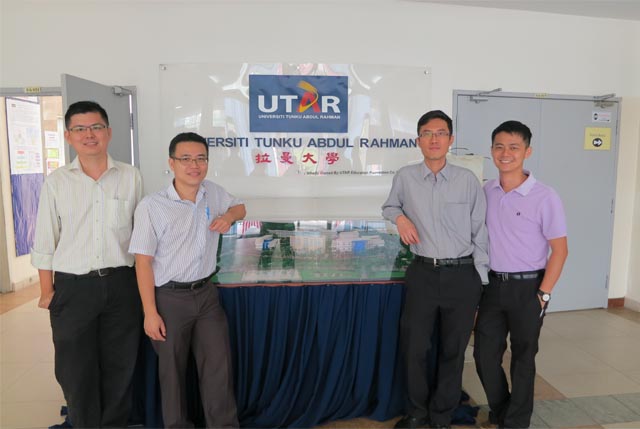

The Co-PIs; (from left) Dr Lee, Dr Lai, Prof Chong and King posing in front of the lobby of FES, UTAR Kuala Lumpur Campus
UTAR Faculty of Engineering and Science (FES) has another cause to celebrate after four of its academics were appointed as Co-Principal Investigators (Co-PIs) for the 2014 Presidents’ Forum of Southeast and South Asia and Taiwan Universities (SATU) Research Scheme which is hosted annually by National Cheng Kung University (NCKU) in Taiwan.
The awarded Co-PIs comprise FES Master and PhD programme head Prof Chong Kok Keong, FES Electrical and Electronic Engineering Department head Dr Lai An Chow, Dr Lee Jer Vui and King Yeong Jin. They share the Co-PIs Award with a team of researchers from Universiti Malaya in Malaysia. The two teams will collaborate on the project titled ‘Grid Connection and Hybrid Wind, PV and Ocean Energy Using Flexible AC Transmission System (FACTS)’ which is spearheaded by Prof Wang Li, the Principal Investigator from the host unit, NCKU College of Engineering and Science.
“This multi-disciplinary project incorporates three components. We will first build an offshore platform that has the ability to float like an offshore oil rig.” explained Dr Lai, “But the offshore platform is used in a different way as we will install a Concentrated Photovoltaics (CPV) system along with a novel solar tracking algorithm on its surface to harvest solar energy and mount a specially-designed wave generator beneath the platform to extract wave energy. The major challenges are the platform stability and the non-static sun-tracking capability as the offshore platform is subject to unpredictable wave fluctuation and change of sun orientation; hence, we will need an embedded control system to address these challenges. This is where my role comes in.” Dr Lai will lend his expertise in embedded systems and micro-controller to the project.
Dr Lai’s vision of the project was further enhanced by a thought-provoking statement from Dr Lee on the pursuance of renewable energy. “One of the key research areas of Malaysia involves renewable energy, mainly because the natural resources in our nation are gradually depleting. This is a long-term project with a sustainable goal,” said Dr Lee, who will utilise his expertise in Mechatronics to complement the embedded control system with Dr Lai. He is expected to play a pivotal role in programming the mobile system.
Meanwhile, King expressed that the cooperation at international level will produce results that are desirable to the renewable energy sector. “The thought of working with like-minded expertise of similar interest was what motivated me to embark on the project. The project is currently in its initial stage and may take up to two years or more depending on its progress. I am looking forward to meeting the other researchers to exchange inputs on the project,” enthused King, whose experience as a former research engineer in offshore and marine technology centre rendered him as one of the torchbearers for this ambitious project.
The axiom - Sun is the backbone of all life forms on earth - could not have befitted Prof Chong any better. Like his compatriots, the solar energy expert will be relied heavily upon for his knowledge in solar cell technology and sun-tracking algorithms in order to create a feasible offshore hybrid solar-wave energy system.
The award will cover travel support for the Co-PIs whose institutions are outside of Taiwan. It includes a visit to NCKU between July and September 2014, a two-night stay at Zenda Suite which is approximately a five-minute walk from NCKU and a reimbursement of not more than NTD20,000 (about USD670) for a round-trip economy class airfare.
The aim of the project is to develop grid-connected, high-capacity hybrid wind, PV and ocean energy systems and available FACTS model by different partners of different universities. Both grid-connected, high-capacity hybrid system and FACTS are combined together while the associated damping controller of the proposed FACTS has to be designed using modern control theories to improve the stability of the connected power systems under various disturbance conditions.
SATU President’s Forum was first held in 2003 to provide a venue for academics to share their experiences to improve the quality of higher education and international cooperation in the region. The SATU International Secretariat, established in NCKU in 2005, launched the SATU Joint Research Scheme to initiate the engagement and mutual cooperation of researches within SATU member universities through integration of academic resources and linkage of research interest among researchers in the region.
Note: The correct photograph for this article should have been the group photo of the Co-PIs instead of the individual Co-PI posted earlier. The error is regretted.
© 2019 UNIVERSITI TUNKU ABDUL RAHMAN DU012(A).
Wholly owned by UTAR Education Foundation Co. No. 578227-M LEGAL STATEMENT TERM OF USAGE PRIVACY NOTICE